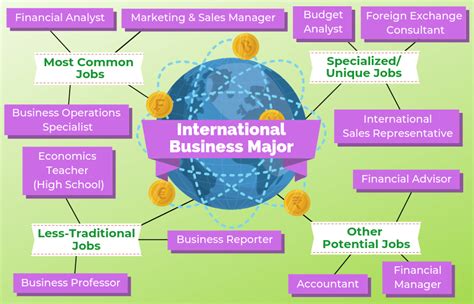In today’s interconnected global economy, international business majors are in high demand. Employers are increasingly seeking professionals who can navigate the complexities of cross-border transactions, cultural differences, and regulatory environments.

What is International Business?
International business involves the exchange of goods, services, and capital between countries. It encompasses a wide range of activities, from importing and exporting to establishing overseas subsidiaries and managing global supply chains.
Why Pursue an International Business Major?
- Global Career Opportunities: Graduates with international business degrees have access to a wider range of career opportunities both domestically and abroad.
- Cultural Understanding and Sensitivity: Studying international business provides students with a deep understanding of different cultures and customs, fostering empathy and cross-cultural communication skills.
- Increased Earnings Potential: International business professionals typically earn higher salaries than their counterparts with domestic-only experience. According to the U.S. Bureau of Labor Statistics, the median annual salary for economists and market researchers with international experience is $105,420.
- Enhanced Problem-Solving and Decision-Making Abilities: Dealing with complex global issues develops analytical thinking, critical problem-solving, and decision-making capabilities.
- Entrepreneurial Mindset: International business majors learn to identify and capitalize on opportunities in emerging markets, fostering an entrepreneurial mindset.
Skills and Knowledge Gained
International business majors develop a comprehensive skill set, including:
- International Finance and Economics: Understanding financial markets, exchange rates, and economic policies.
- Global Marketing and Management: Developing and implementing marketing strategies and managing operations in international contexts.
- International Law and Regulations: Navigating legal and regulatory frameworks across borders.
- Cross-Cultural Communication: Building effective relationships and communicating effectively across cultural boundaries.
- Analytics and Data Interpretation: Analyzing data to identify trends and make informed decisions.
Table 1: International Business Curriculum
| Course | Description |
|---|---|
| Economics of Globalization | Examines the impact of globalization on economic growth, trade, and development. |
| International Business Law | Provides a comprehensive understanding of legal issues related to cross-border business transactions. |
| Global Marketing Management | Explores the principles and practices of marketing products and services in international markets. |
| International Financial Management | Covers the management of financial resources, exchange rates, and risk in international business. |
| Cross-Cultural Communication | Develops skills in intercultural communication, including language, etiquette, and negotiation. |
Table 2: Careers for International Business Majors
| Industry | Position |
|---|---|
| Banking and Finance | International Banker, Financial Analyst |
| Consulting | International Business Consultant, Market Research Analyst |
| Marketing and Sales | Global Brand Manager, International Sales Manager |
| Supply Chain and Logistics | International Supply Chain Manager, Global Logistics Coordinator |
| Government and Non-Profit | Foreign Service Officer, International Development Officer |
Effective Strategies for Success
To succeed in an international business career, consider the following strategies:
- Acquire Language Proficiency: Learn a foreign language to enhance communication and cultural understanding.
- Gain Global Experience: Participate in study abroad programs, internships, or volunteer opportunities overseas.
- Network and Build Relationships: Attend industry events and connect with professionals in your field.
- Stay Informed: Keep up-to-date with current events, economic trends, and technological advancements.
- Embrace Innovation and Technology: Utilize technology to facilitate communication, collaboration, and market research.
Table 3: Benefits of International Business
| Stakeholder | Benefit |
|---|---|
| Companies: | Expanded market reach, increased revenue, diversification of risk |
| Consumers: | Access to a wider variety of goods and services, lower prices |
| Governments: | Economic growth, job creation, improved living standards |
| Society: | Cultural exchange, increased understanding, reduced conflict |
Why an International Business Education Matters
An international business education provides students with the knowledge, skills, and mindset to thrive in today’s global economy. It prepares graduates for:
- Navigating Transnational Challenges: Understanding and addressing the challenges and opportunities associated with operating in a borderless world.
- Capitalizing on Emerging Markets: Identifying and leveraging opportunities in rapidly developing economies.
- Fostering Sustainable Development: Contributing to sustainable economic and social development through responsible business practices.
- Building a More Inclusive and Interconnected World: Promoting cultural understanding, economic cooperation, and global harmony.
Table 4: Future Trends in International Business
| Trend | Impact |
|---|---|
| E-commerce and Digital Transformation: Cross-border e-commerce and digital technologies are revolutionizing global trade. | |
| Artificial Intelligence and Automation: AI is expected to automate tasks and improve efficiency in international business processes. | |
| Sustainability and Social Responsibility: Companies are increasingly focusing on environmental and social impact. | |
| Blockchain and Cryptocurrency: Blockchain technology has the potential to transform international payments and trade. | |
| New Economic Partnerships: Strategic alliances and free trade agreements are reshaping global economic dynamics. |
Conclusion
International business majors are essential for the success of businesses and the global economy. They possess a deep understanding of international markets, cultural differences, and business practices. By embracing this field, you will open up a world of opportunities, contribute to global growth, and make a positive impact on society.
